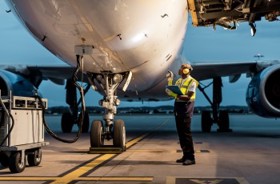Source: IATA

The International Air Transport Association (IATA) highlighted three priorities for ground handling at the IATA Ground Handling Conference (IGHC) which opened in Reykjavík today hosted by Icelandair: 1. Improving safety through reducing operational risk 2. Implementing global standards 3. Embedding sustainability – people, planet, and prosperity – in all activities.
“Ground handling forms the backbone of aviation. It is critical to ensuring the safe and efficient transport of millions of travelers each year. With travel demand for the upcoming peak Northern summer season predicted to surge by 12% over last year, the ground handling sector will need to be ready. Our priorities are clear: improving safety, implementation of global standards and embedding sustainability in all activities,” said Monika Mejstrikova, IATA’s Director of Ground Operations.
Safety
Safety is aviation’s top priority. IATA outlined three priority areas for ground handling:
Reducing ground damage through transitioning to Enhanced Ground Service Equipment (Enhanced GSE)
“The aviation industry is facing a massive challenge. With the number of flights expected to rise, ground damage costs could reach $10 billion by 2035. A key mitigation measure is the adoption of Enhanced GSE to make the ramp a safer place for both personnel and aircraft. This has the potential to reduce ground damage costs by 42%,” said Mejstrikova.
IATA has introduced the Enhanced GSE Recognition Program to encourage the use of upgraded ground support equipment (GSE) which uses anti-collision and inching technology to improve vehicle control and increase docking accuracy. Ground handlers who integrate more enhanced GSE into their fleets above a set threshold will receive a two-year recognition stamp.
Using data to enhance injury prevention
Data from the IATA Global Incident Data eXchange (IDX) shows that slips, trips, falls, and impacts are the main injuries in ground handling, with falls from heights posing the most serious risks. In response, IATA has initiated a safety campaign emphasizing adherence to industry standards outlined in the IATA Ground Operations Manual (IGOM) and implementing training from the Airport Handling Manual (AHM).
Mitigation of loading errors
The primary loading errors are nets not properly deployed, inadequate cargo or baggage securing and discrepancies between load sheets and Load Instruction Reports. To address these, IATA has collaborated with stakeholders to digitize communication between load control and loading teams. Adoption of these digital solutions has reduced loading errors by up to 80%, reduced delays by 30%, and minimized paper documentation.
Global Standardization of Processes
Global standards are the foundation for safe and efficient operations. Two key tools for ground handling service providers (GHSPs) are the IATA Ground Operations Manual (IGOM) and the IATA Safety Audit for Ground Operations (ISAGO).
IGOM: To accelerate the adoption of IGOM global standards, in 2022 IATA launched the Operation Portal (OPS). Among its many functions, the portal analyses gaps between manuals used by GHSPs and airlines. OPS portal membership includes over 160 airline members, 80 GHSPs, and there have been 111 published gap analyses.
ISAGO: In 2023, a total of 303 ISAGO audits were conducted, an 18% increase from the previous year. The ISAGO network has also expanded significantly to include 210 GHSPs across 365 accredited stations in 221 airports worldwide. Currently, 153 airlines utilize ISAGO audit reports as part of their risk management when outsourcing ground operations. Furthermore, nearly 40 regulators and airports endorse ISAGO to complement their monitoring, compliance, performance, or licensing systems through cooperation agreements.
Forging a sustainable path forward
IATA recently launched a sustainability roadmap for ground operations, centered around three pillars—People, Planet, and Prosperity.
People: Last year, IATA launched the IATA Ground Operations Training Passport to promote professional development and staff retention, with the Lufthansa Group as the pioneer organization. This initiative mutually recognizes skills and training across ground handlers, airlines, and airports, facilitating the cross-utilization of skilled personnel.
Planet: Transitioning to GSE powered electrically or with biofuels is part of the overall effort to reach net zero carbon emissions for aviation by 2050. IATA is supporting ground handlers in making informed transitions towards cleaner GSE power.
Prosperity: Financial sustainability is paramount for any business and ground handling is no exception. Reducing turnaround costs, minimizing operational delays, decreasing ground damage through efficiency gains, digitalization and automation will be key contributor to increasing the sector’s profitability.
